Gie Goris was van december 1990 tot september 2020 voltijds actief in de mondiale journalistiek, eerst als hoofdredacteur van Wereldwijd (1990-2002), daarna als hoofdredacteur van MO* (2003-juli 20
You need a good assist to score a goal
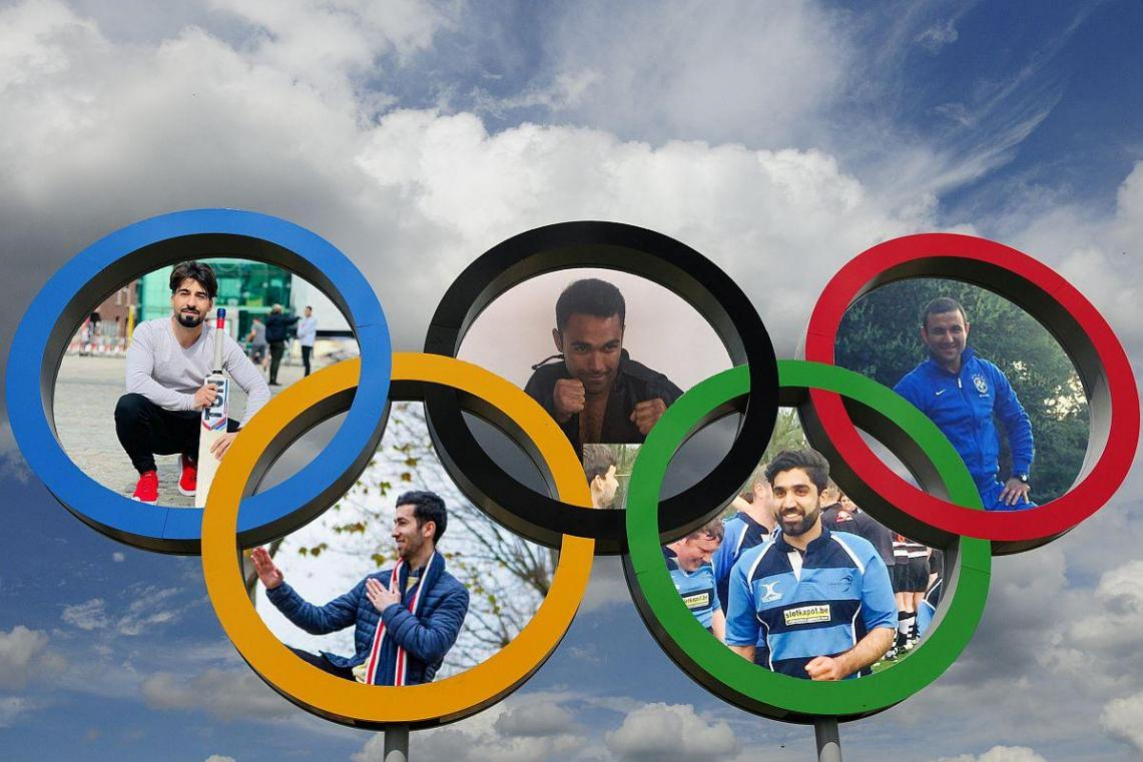
Once new to Belgium, they sought and found their place in society through sport: Wali Sediqi, Arash Warasy, Sahadi Daria (top, left), Abdulrashid Karim Dostikhel and Hasib Jan Habibi (bottom).
© Sociaal.Net / Lisa Develtere (foto top left), rights reserved (other). Collage: MO*
How does a young, unaccompanied migrant find his way in a new country? Education. Work. Language. The standard answers to the question are not incorrect, but certainly not always sufficient. Why isn’t more attention paid to sports? Is it because those in charge of policies are not sweating enough and are sitting in meetings too much?
The sports club. For adolescent boys it seems the ideal place to try out a new society, with its rules, codes, language and relationships. Sahadi Daria knows it from his own experience: the network he found in KFC Arendonk Sport, the soccer club close to the asylum center he lived after arriving in Belgium, was a real springboard.
Thanks to the contacts in the club, and the feeling of being part of the local community, he found his way to school – which he could not attend for all the 17 years of his young life before – and through many intermediate steps, eventually became the young principal of De Apenstaartjes, a Municipal Primary School on Antwerp Left Bank.
The network he found in the local soccer club, became a trampoline for life
Hasib Jan Habibi also passed through Arendonk’s sports infrastructure – in his case it was the judo club, in which he made a string of Belgian friends, in particular a family in the town of Lille (not the French city), where he also lived for a number of months and where he returned to regularly for parties.

Afghan Hasib Jan Habibi on the rugby field. He also made a number of Belgian friends at the judo club in Arendonk.
© Hasib Jan Habibi
And the now 26-year-old Hasrat Irfanullah ended up at Kiel FC soccer club, together with an Eritrean boy he had met on evening Dutch courses. ‘I came to Europe with one big dream,’ Hasrat laughs. ‘To play for Real Madrid.’ He is well aware that he ended up in the wrong country for that and that Kiel FC, even before training was halted due to covid measures, is a very distant echo of what happens at the Bernabéu.
Nevertheless, he is already further ahead than what is usual in Afghanistan: from a dusty and bumpy field with a bad ball, he made it to a team that plays on real grass and with real soccer equipment. The only way is up!
Davud Mirza, who received his Bachelor’s degree in Social Work with a dissertation on the needs and requirements of underage Afghan asylum seekers, does agree that the sports club is where many Afghan boys find a Belgian network and therefore the way to a better future. But it is not an exclusive path, he underlines. Above all, you can’t sit and wait, hoping that someone else will come and solve your problems for you. You have to take steps yourself by getting involved in volunteer work, by playing sports, by going out …’.
Diversity in the club
‘Building a good network is much more complex in a metropolitan context’, Sahadi Daria says with the Arendonk years in mind. ‘In smaller towns or villages there is less peer pressure, less danger of ending up in wrong circles or hanging around on dimly lit squares until late at night. But it is also possible in Antwerp, where many young people play cricket, soccer, kung fu or taekwondo. There you learn in a playful way how the local culture in a city like Antwerp works’, Daria believes.
Playful doesn’t necessarily or always mean conflict-free
Playful doesn’t necessarily or always mean free of conflict. There are clashes on or around the field from time to time. Shakerullah Nanikhel, who is trying to set up a youth work group from the mosque, says that he sometimes has to put out fires, like the time he received a call from Park Spoor Noord, where an Afghan cricket team had gotten into a fight with an Afghan soccer team. ‘Nothing ethnic’, Shakerullah assures. ‘In both groups, both Pashtun and Dari speaking youngsters were playing. It was just a fight for space: who was first, who had the right to the field, really a classic riot between adolescents.’
For the cricket playing boys of Antwerp’s Park Spoor Noord, sport seems at first glance less a shortcut to a Flemish network and more a way of coming together with peers, even to distinguish themselves with a separate sport and with their own heroes from the mainstream fixation on soccer or cycling.
There’s nothing wrong with that, but there has to be guidance, Shakerullah Nanikhel believes. He repeated it a few times during our conversation: the government only seems to pay attention to Turkish and Moroccan young people; they get subsidies, organizations, facilities, there is attention for them. They can learn indoor soccer, taekwondo or karate. Others, like the Afghan youth, are left out in the cold, he says.
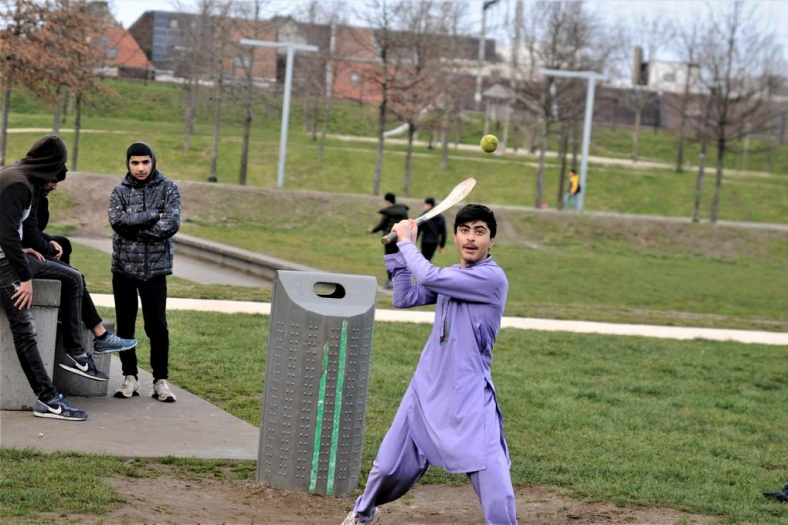
Afghan youths play cricket in Antwerp’s Park Spoor Noord. In cricket you have to practise and update skills, play together with others, know and follow the rules carefully.’
© Hussainy Qudratullah
When I ask why the Afghan youths do not join the existing facilities and clubs, Nanikhel says there are many reasons for this. Language is one of them, culture another, but the social threshold is more important: ‘Those Moroccan boys come to the club wearing expensive, trendy clothes and shoes. Because their parents can afford it.
But for the Afghan boys those things are unaffordable. They feel inferior, they think they are looked down upon. And so they stay away. Moreover, the Afghan boys have no experience with the billiards table there, they can’t play ping-pong and they don’t have expensive Playstations at home with which they can practice. Still, they don’t want to be losers.’
We should not try to isolate Afghan youth, boxing coach Arash Warasy feels. ‘There is enough pressure on them already from the conservative side.’
Tired of waiting for government initiative, Shakerullah and a few others took matters into their own hands. They are currently preparing a youth center above the mosque on Tulip Street. For this they received a 3,500 euro subsidy from the city. ‘Of course we can’t pay for the renovation with that,’ he responds to my comment that you don’t jump far with such a short stick. ‘But we are happy with the recognition and the funds with which we bought two computers, and tables and chairs.’
That doesn’t sound like the start of your own sports club. Nor is that necessary, responds Arash Warasy. He was active for years as a boxing coach and fitness trainer in Antwerp and does not recognize the story about social exclusion of Afghan youth. We should not try to isolate Afghan youth, he feels. ‘There is enough pressure on them already from the conservative side. Together in the club with other young people from the city is much better, and it’s not a problem either.’
Character, concentration, teamwork
Abdulrashid Karim Dostikhel, by the way, thoroughly disagrees with my assessment that cricket is less suitable for finding your way in Belgian society. When he was on the run in Brussels with no papers and no place to live, it was the opportunity to take part in a cricket tournament, together with some other Afghan youths he met in Molenbeek, that set him on his way. In the meantime, he is a youth facilitator himself, currently for the government agency dealing with asylum seakers, in Steenokkerzeel.
‘Cricket,’ says Abdulrashid, ‘is an excellent way to put the Afghan youth on the road to a better future. It is a sport in which you have to practice and update skills, in which you play with others, in which you have to know and follow the rules meticulously.’ Cricket is, in other words, a character sport, and it is precisely in that area that he believes the Afghan boys need all the support they can get. But that is largely absent.
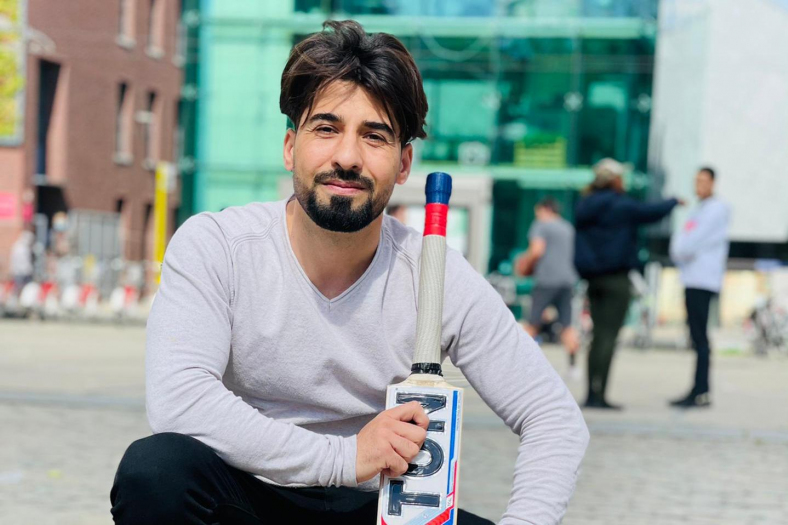
The same conviction is heard from Wali Sediqi, who coaches starting entrepreneurs but is also an enthusiastic taekwondo amateur. Taekwondo is the art of striking with hands and feet, says Sediqi, but not at random. ‘It’s about a very special way of being in life: with a lot of self-control, a lot of discipline, a lot of practice.’ He only got that insight when he had the possibility in Belgium to look up that kind of know-how on the Internet.
The sport itself, he learned about as a refugee child in Iran. ‘Every Afghan youth has moments when he thinks: this is where it stops, I can’t do it anymore, I give up. But those who have been shaped by sport know that giving up is not an option. To keep going is the core of the mindset that comes from playing sports.’
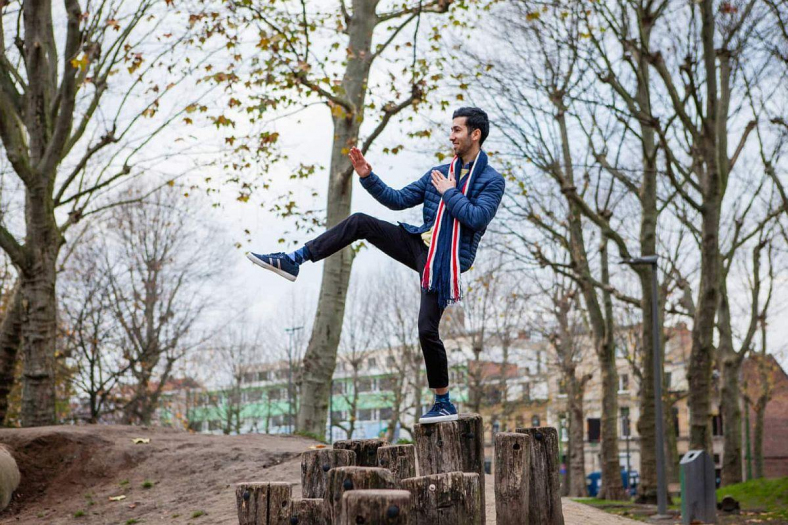
Taekwondo practitioner Wali Sediqi: ‘Those who have been shaped by sport know that giving up is not an option’.
© Sociaal.net / Lisa Develtere
‘Because you’re concentrating and physically engaged at the same time, you can put everything aside for a moment.’
Arash Warasy also emphasizes the formative value of sport: ‘Boxing does not only require an excellent condition, for which you have to eat, sleep and live correctly. You also have to be constantly alert, very precise and therefore one hundred percent focused. So boxing provides a healthy lifestyle, and above all mental focus.’
How can that work, I ask, with young people whose heads are full of trouble: trauma’s from the the journey, worries about the family at home, difficulties in finding a place in this country of arrival?
‘Exactly for those reasons,’ Warasy responds. ‘Because you’re concentrating and physically engaged at the same time, you can put everything aside for a moment. And that often produces a clearer view of the challenges afterwards.’

Arash Warasy, boxing coach for years: ‘For boxing, you have to be constantly alert, very precise and therefore one hundred percent focused. So it provides a mental focus.
© Arash Warasy
It is these aspects of boxing that explain why the sport is so popular among young people from immigrant backgrounds, according to Warasy. At the club near Park Spoor Noord, where he was active for many years, he estimates that at least half of the boxers were refugees and asylum seekers.
Our sport belongs here
Abdulrashid Dostikhel realizes that the absence of support or interest in cricket players has less to do with the origin of the players, than with the general unfamiliarity of the sport in our parts.
However, he says, cricket has Flemish roots. The game crossed the Channel with them when Flemish weavers migrated to England. It is a theory developed by an Australian historian, and Abdulrashid adopts it enthusiastically.
‘So much talent has migrated to Belgium in the meantime, that we can have the highest ambitions.’
A German linguist, in turn, explains that the term cricket derives from “met de krik ketsen” (‘to ketch with the jack’, where the jack was the crooked shepherd’s staff.
‘We are going to make sure that cricket returns to the country where the sport originated,’ he says ambitiously. ‘So much talent has migrated to Belgium in the meantime, that we can have the highest ambitions.’
In anticipation of that World Cup, Abdulrashid set up the initiative ‘Jongeren Integreren door Cricket’ (@JongerenIC) together with the Antwerp neighbourhood youth organization Kras vzw and others. This is not just a Facebook page, it also stands for five major events – which are now unfortunately on hold. That such a valuable initiative, after a short period of funding from the citizens’ budget, runs out of money, is, according to Antwerp alderman Tom Meeuws (Vooruit), a sign that the city is making mistakes. He promised at a meeting with Afghans (in connection with this dossier) to work on a better and sustainable approach.
In the meantime, Abdulrashid is already happy that, after years of pleading and asking, a separate “cricket cage” has been built in Park Spoor Noord. And that cricket teams are emerging in a number of other places, such as his Beveren Cricket Club, with which he himself became Belgian champion in 2019.
Oh, and he was also selected for the national team, in which Afghans, Indians and Pakistanis are currently battling side by side for Belgian honors.
‘A cricket field is a place where otherwise unreachable young people come together. There you can get to know them, gain insight into their dreams but also into their needs.’
‘To get that necessary two-way traffic going, sports is often a much more natural route for Afghan boys than discussion groups or civil society organizations.’
One of the major deficits Abdulrashid identifies in many Afghan youth is their lack of overview and planning. ‘They have too few plans for the future and because of their low level of education they are not able to formulate and implement goals in a systematic way. So they do what you often see in Afghanistan itself among adolescents: they spend the night playing cards or other games, sometimes drugs are used and the story ends on the street where they harass others – women, in particular.’
You can’t let these Afghan boys down, Abdulrashid still believes, you have to bring them together, appeal to them, captivate them and guide them. And that can be done, for example, around the batsman and the wickets. ‘If you want to activate them, appeal to their dormant ambitions, there’s nowhere better to start than there. In this way, the cricket field becomes the first place where they feel at home and where they learn that home is here from now on: Antwerp, Belgium.’
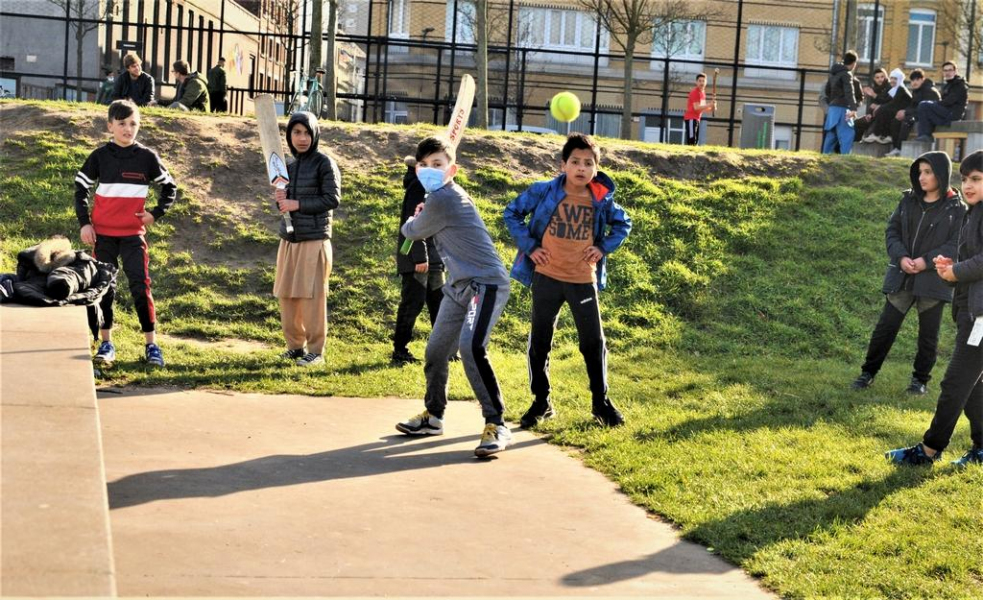
© Hussainy Qudratullah
No team without a trainer, no sport without a coach
The importance of coaching means, in sports terms, investing in good trainers and coaches. ‘Anyone can become a trainer,’ says Arash Warasy. ‘But not everyone is a good coach.’ Arash himself became a coach because, despite his boxing talent, he could not break through into professional sport: without legal residency papers you simply cannot become a champion.
‘A coach is like a parent, especially for the unaccompanied youth. You have to be able to listen to their problems, but you also have to help them get over them. And above all you have to be an example. Walk your talk. Because a good coach is respected and followed, so your responsibility is big.’
‘Young people are left to their fate for too long.’
‘Young people need confidence,’ agrees Davud Mirza. ‘And recognition,’ adds Arash Warasy. Trust from the coaches and recognition from society, ‘but you also have to give and earn trust’, Mirza emphasizes. To get that necessary two-way traffic going, sports is often a much more natural route for Afghan boys than discussion groups or civil society organizations. For girls it is more difficult, because they are less free to expand their network or choose their leisure activities.
What Mirza, as well as Warasy and Dostikhel, see lacking, is a government that recognizes and invests in the importance of sports coaches in building the super-diverse city. After all, it is precisely in the informal context of self-chosen pathways and aspirations that the acquisition of social skills proceeds best.
This does not require a recognized status. Coaching is a form of street work that deserves much more attention, recognition and funding. Warasy: ‘Young people are left to their fate for too long. If they only receive papers and guidance after years, so many chances have already been wasted.’
The same message was heard explicitly at the meeting that aldermen Tom Meeuws and Karim Bachar had with thirteen Afghans from Antwerp on June 30. ‘They are young and very vulnerable’, Hakim Nawabi said about the underage boys who have to find their way in the city on their own. Hakim works as professional in the refugee reception center of Arendonk.
‘If they get the appropriate help now, there’s a good chance they’ll be able to pick up where they left off. Otherwise later, the problems become bigger and harder to deal with.’
Several others in the circle confirmed, but warned that the necessary psychological care should not be offered in the form of therapy or a session at the psychologist, because that is immediately linked to being crazy. Investing in sports counseling is betting on low-threshold care, on spontaneous assimilation, on feeling good. And ultimately: on scoring.
 This article was written with the support of the Pascal Decroos Fund and is part of the online dossier The City belongs to Afghans, too (dutch).
This article was written with the support of the Pascal Decroos Fund and is part of the online dossier The City belongs to Afghans, too (dutch).
Maak MO* mee mogelijk.
Word proMO* net als 2793 andere lezers en maak MO* mee mogelijk. Zo blijven al onze verhalen gratis online beschikbaar voor iédereen.
Meer verhalen
-
Report
-
Report
-
Report
-
Interview
-
Analysis
-
Report










 Oxfam België
Oxfam België Handicap International
Handicap International